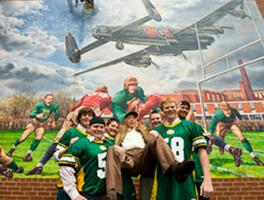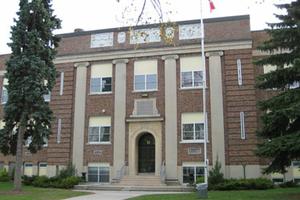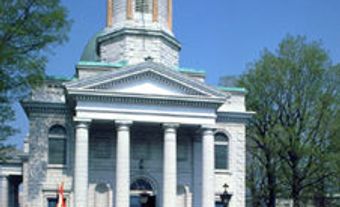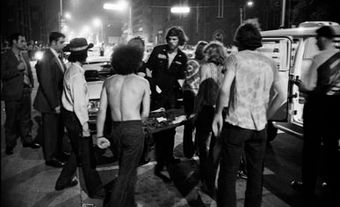This content is from a series created in partnership with Museum Services of the City of Toronto and Heritage Toronto. We gratefully acknowledge funding from the Ontario Ministry of Tourism, Culture and Sport, and the Department of Canadian Heritage.
Toronto Feature: Etobicoke Collegiate Institute
"High Flier of Etobicoke Collegiate Institute"
In May 1944, Harold Shipp became an Etobicoke legend. The 18-year-old somehow managed to convince a ferry pilot to fly a roaring Lancaster bomber over the playing field during a football game and drop cards, many of which could be traded for prizes. It was a one-of-a-kind stunt to raise money for bleachers for the football field. When the bomb bay opened, the stunt went awry in a one-of-a-kind way; the wind blew the cards into the Chinese market gardens nearby. Hundreds of students rushed into the carefully tended cabbages and Shipp was rushed into the principal's office.
Etobicoke Collegiate Institute (ECI) was founded in 1928, when Islington Village was still a relatively sleepy community surrounded by farmers' fields. Prior to that date, students in the area either headed down to Mimico on the lakeshore or north to Weston to attend high school. ECI was first a rural school, meeting the needs of students from across central Etobicoke Township. Its many additions reflect the growth of the township into a city.
Since its founding, generations of Etobicoke students have played on the field that the Lancaster buzzed. Among its alumni the school proudly numbers Montreal Canadiens legend Ken Dryden, musician Jeff Healey, Olympic gold medalist Marnie McBean (see rowing), former Ontario cabinet minister and Speaker of the House, Chris Stockwell, and, of course, Harold Shipp.

 Partager sur Facebook
Partager sur Facebook Partager sur X
Partager sur X Partager par Email
Partager par Email Partager sur Google Classroom
Partager sur Google Classroom





